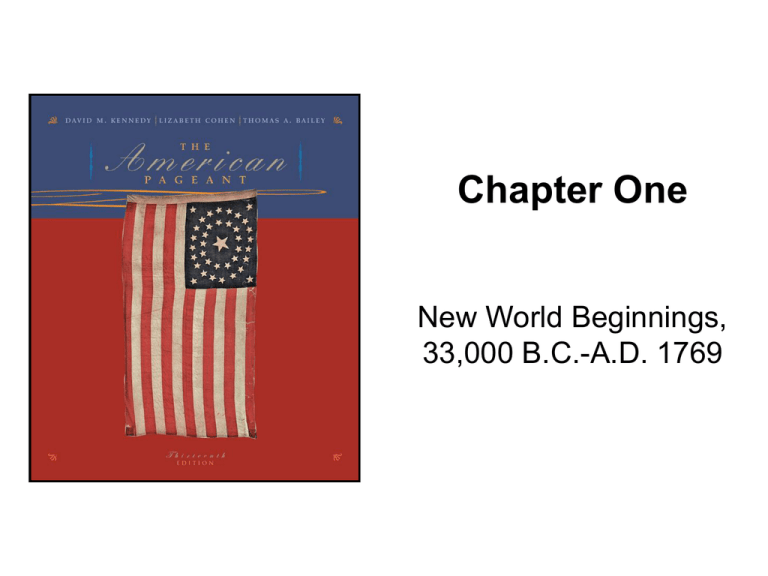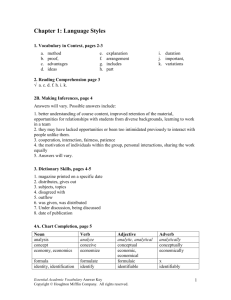
Chapter One
New World Beginnings,
33,000 B.C.-A.D. 1769
Kennedy, The American Pageant
Chapter 1
The final landscape of the North
American continent were determined
about 10,000 years ago by
1. the last retreat of the Great Ice Age glaciers.
2. the thrusting up of the Appalachian mountain
range.
3. the meteorological catastrophe that killed the
dinosaurs.
4. the shifting of the earth’s tectonic plates that once
united the Americas and Africa.
Copyright © Houghton Mifflin Company. All rights reserved.
1-2
Kennedy, The American Pageant
Chapter 1
The final landscape of the North
American continent were determined
about 10,000 years ago by
1. the last retreat of the Great Ice Age glaciers.
Hint: See page 5.
Copyright © Houghton Mifflin Company. All rights reserved.
1-3
Kennedy, The American Pageant
Chapter 1
The most persuasive theory
regarding the origins of American
Indians is that they originally came
from
1. Africa.
2. Siberia.
3. the South Pacific islands.
4. Europe.
Copyright © Houghton Mifflin Company. All rights reserved.
1-4
Kennedy, The American Pageant
Chapter 1
The most persuasive theory
regarding the origins of American
Indians is that they originally came
from
2. Siberia.
Hint: See page 6.
Copyright © Houghton Mifflin Company. All rights reserved.
1-5
Kennedy, The American Pageant
Chapter 1
The most sophisticated Indian
civilizations were those erected by
the
1. Cherokees.
2. Sioux, Cheyenne, and Arapahoes.
3. various tribes of California.
4. Mayas, Incas, and Aztecs.
Copyright © Houghton Mifflin Company. All rights reserved.
1-6
Kennedy, The American Pageant
Chapter 1
The most sophisticated Indian
civilizations were those erected by
the
4. Mayas, Incas, and Aztecs.
Hint: See page 6.
Copyright © Houghton Mifflin Company. All rights reserved.
1-7
Kennedy, The American Pageant
Chapter 1
The largest and most powerful Indian
confederacy in the territory of the
present United States was
established in the sixteenth century
by the
1. Iroquois.
2. Anasazi peoples.
3. Pueblos.
4. Powhatans.
Copyright © Houghton Mifflin Company. All rights reserved.
1-8
Kennedy, The American Pageant
Chapter 1
The largest and most powerful Indian
confederacy in the territory of the
present United States was
established in the sixteenth century
by the
1. Iroquois.
Hint: See page 10.
Copyright © Houghton Mifflin Company. All rights reserved.
1-9
Kennedy, The American Pageant
Chapter 1
The first European nation to sail
around Africa and establish large
slave-labor plantations was
1. Britain.
2. Norway.
3. Spain.
4. Portugal.
Copyright © Houghton Mifflin Company. All rights reserved.
1-10
Kennedy, The American Pageant
Chapter 1
The first European nation to sail
around Africa and establish large
slave-labor plantations was
4. Portugal.
Hint: See page 11.
Copyright © Houghton Mifflin Company. All rights reserved.
1-11
Kennedy, The American Pageant
Chapter 1
Among the Indian agricultural
products that eventually contributed
to the European diet were
1. pork, beets, and sugar cane.
2. rice, manioc, and peanuts.
3. corn (maize), beans, and tomatoes.
4. wheat, oats, and barley.
Copyright © Houghton Mifflin Company. All rights reserved.
1-12
Kennedy, The American Pageant
Chapter 1
Among the Indian agricultural
products that eventually contributed
to the European diet were
3. corn (maize), beans, and tomatoes.
Hint: See page 10.
Copyright © Houghton Mifflin Company. All rights reserved.
1-13
Kennedy, The American Pageant
Chapter 1
The primary cause of the death of
about 90 percent of the original
Indian population in the centuries
after Columbus’s arrival was
1. genocidal warfare.
2. syphilis.
3. diseases like smallpox, yellow fever, and malaria.
4. a drastic decline in the Indian birth rate.
Copyright © Houghton Mifflin Company. All rights reserved.
1-14
Kennedy, The American Pageant
Chapter 1
The primary cause of the death of
about 90 percent of the original
Indian population in the centuries
after Columbus’s arrival was
3. diseases like smallpox, yellow fever, and malaria.
Hint: See page 15.
Copyright © Houghton Mifflin Company. All rights reserved.
1-15
Kennedy, The American Pageant
Chapter 1
Spain gained the greatest riches of
its American empire by
1. colonizing the fabled golden cities discovered by
Francisco Coronado.
2. exploiting Aztec and Inca labor.
3. seizing Indian gold and silver and mining more of
the precious metals.
4. importing African slaves to work its sugar
plantations.
Copyright © Houghton Mifflin Company. All rights reserved.
1-16
Kennedy, The American Pageant
Chapter 1
Spain gained the greatest riches of
its American empire by
3. seizing Indian gold and silver and mining more of
the precious metals.
Hint: See page 20.
Copyright © Houghton Mifflin Company. All rights reserved.
1-17
Kennedy, The American Pageant
Chapter 1
Which of the following was not
among the motives that drove the
Spanish conquistadores in their New
World exploits?
1. a lust for gold and silver
2. a humanitarian desire to end practices like human
sacrifice
3. a desire to win royal titles and favors by
expanding Spain’s empire
4. a hope of winning God’s favor by bringing
Christianity to pagan peoples
Copyright © Houghton Mifflin Company. All rights reserved.
1-18
Kennedy, The American Pageant
Chapter 1
Which of the following was not
among the motives that drove the
Spanish conquistadores in their New
World exploits?
2. a humanitarian desire to end practices like human
sacrifice
Hint: See page 19.
Copyright © Houghton Mifflin Company. All rights reserved.
1-19
Kennedy, The American Pageant
Chapter 1
The Spanish conquistador Hernán
Cortés was able to defeat the Aztecs
partly because
1. he had a larger and better trained army.
2. the Aztec emperor Moctezuma initially welcomed
Cortés into his capital city.
3. Cortés was able to call on reinforcements from
Spain.
4. the Spanish were more highly motivated by
religious fervor.
Copyright © Houghton Mifflin Company. All rights reserved.
1-20
Kennedy, The American Pageant
Chapter 1
The Spanish conquistador Hernán
Cortés was able to defeat the Aztecs
partly because
2. the Aztec emperor Moctezuma initially welcomed
Cortés into his capital city.
Hint: See page 20.
Copyright © Houghton Mifflin Company. All rights reserved.
1-21


